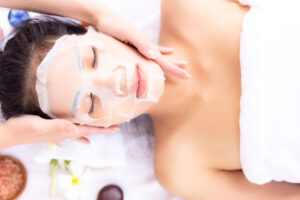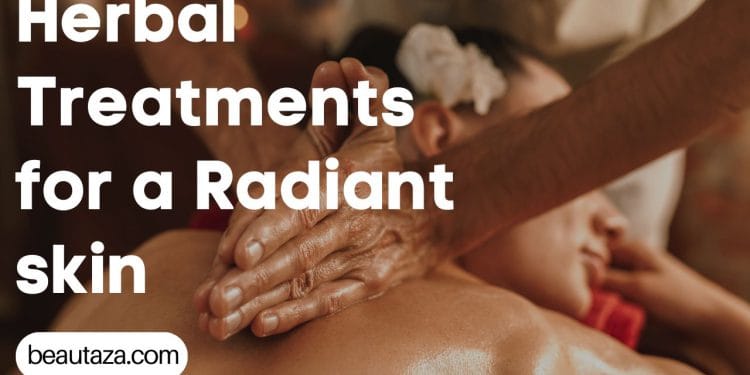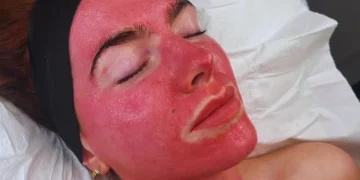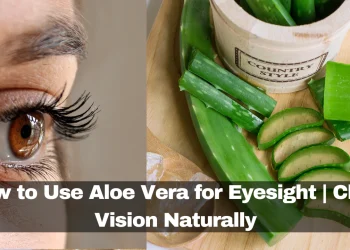
I will discuss Herbal Treatments for Radiant skin in this blog post. Many of us use natural and holistic methods to improve our beauty and well-being regimens in today’s fast-paced society. A rise in interest in herbal face treatments is attributed to the desire to avoid harsh chemicals and synthetic components. These herbal medicines, which harness the power of nature, provide a gentle but efficient method to nourish, renew, and maintain a beautiful complexion.
Herbal cosmetics have a long history in skincare that dates back to centuries-old cultures. They rely on the healing powers of different plant-based compounds to treat various skin issues. There is a herbal treatment for every skin condition, from hyperpigmentation to aging, dryness, and acne.
Herbal skincare regimens use a comprehensive approach, which sets them unique. These treatments seek to rebalance and activate the skin’s natural healing mechanisms rather than only making surface-level changes. Herbal remedies encourage long-term skin health and brightness by feeding and strengthening the skin from the inside out.
Understanding Herbal Treatments for the Face
Many cultures have used plants for health and beauty for centuries. These natural skin care products nourish and improve skin health. Herbal medicines may unlock nature’s power for a bright and radiant complexion.
Herbal skincare uses plant-based substances to address skin concerns. Plant leaves, flowers, roots, barks, and other parts contain these skin-beneficial compounds. Herbal medicines use nature’s healing power instead of chemicals.
Herbal remedies promote self-healing. Vitamins, antioxidants, and bioactive elements from herbal medicines help the skin’s natural processes. Herbal therapies address the root causes of skin issues and improve skin health.
Cosmetic herbs offer skin-beneficial properties. Aloe vera soothes and hydrates sensitive skin. Vitamins and antioxidants in rosehip oil help diminish scars and keep skin looking fresh. Green tea’s anti-inflammatory and antioxidant properties help cure acne and decrease redness.
Herbal ingredients have specific properties and a long history of use. Ancient Egyptians, Greeks, and Ayurvedic practitioners employed herbs for beauty. Modern research confirms the efficacy of these time-tested remedies.
When using herbal beauty remedies, consider quality and origin. Organic and ethically farmed herbs provide these components’ purest and most potent forms. Know your plant allergies and sensitivities to avoid harmful reactions.
Popular Herbal Ingredients for Facial Care
Herbal face treatments may improve your skin with natural ingredients. Vitamins, minerals, antioxidants, and other bioactive chemicals in these herbal ingredients nourish, renew, and restore the skin’s natural beauty. Let’s explore some of the most popular herbal face care ingredients and their benefits:
Aloe vera, known as the “plant of immortality,” has been used for centuries to soothe and heal. Its vitamins, minerals, and antioxidants moisturize and soothe the skin. Aloe vera may reduce irritation, redness, and skin regeneration.
Rosehip: Rosehip oil contains vitamins, antioxidants, and fatty acids from wild rose bush seeds. It reduces wrinkles, fine lines, and hyperpigmentation in aged skin. Rosehip oil hydrates and brightens skin.
Green tea: An excellent drink with great skin-care benefits. Anti-inflammatory and antioxidant polyphenols and catechins are rich in them. Green tea reduces oil production, inflammation, and acne. It protects against environmental damage and rejuvenates tired skin.
Chamomile relaxes and sedates. Its antioxidant and anti-inflammatory effects make it popular in skincare products. Chamomile reduces redness, soothes sensitive skin, and improves skin look. It’s also gentle for dry skin.
Calendula: Marigold, or calendula, has been used therapeutically for years. It contains skin-calming, anti-inflammatory, and antibacterial effects. Calendula soothes sensitive skin, reduces redness, and speeds up wound healing. Creams, ointments, and salves include it because it regenerates the skin.
Lavender: Lavender has a soothing aroma and skincare benefits. Antibacterial and anti-inflammatory properties improve acne-prone skin. Lavender may brighten skin, soothe irritations, and reduce oil production. Its calming scent may improve health.
Herbal Treatments for Common Skin Issues
Herbal medications treat many skin conditions. Natural cures for acne, dryness, aging, and hyperpigmentation exist. Let’s examine some common skin issues and how herbs may help:
Acne causes pimples, blackheads, and whiteheads. Herbal acne treatments reduce edema, oil production, and skin-surface bacteria. Antibacterial tea tree oil is used as a spot treatment for acne. Antibacterial and anti-inflammatory neem may soothe and heal acne-prone skin.
Dryness: Flaky, tough skin may be uncomfortable. Herbal medicines may nourish and hydrate dry skin. Aloe vera, rosehip oil, and chamomile hydrate and relax the skin’s moisture barrier. Jojoba and argan oils seal in moisture naturally.
Aging: Wrinkles, fine lines, and loss of elasticity occur naturally with age. Herbal medicines may slow aging and improve skin. Rosehip oil, rich in antioxidants, and vitamins A and C, may boost collagen production and reduce wrinkles. Polyphenol-rich green tea may soften and protect the skin.
Hyperpigmentation: Excess melanin causes dark skin areas. Herbal medicines may lighten hyperpigmentation. Turmeric face masks, and serums may reduce dark spots. Licorice root extract may help hyperpigmentation fade.
Redness and Sensitivity: Sensitive skin is red, irritable, and hypersensitive to external stimuli. Herbal medicines may soothe inflamed skin. Chamomile may reduce inflammation. Anti-inflammatory and healing calendula may soothe sensitive skin.
DIY Herbal Face Treatments
An excellent method to use the power of nature and customize your skincare regimen is to make herbal face treatments. You may make masks, toners steams, and more customized to your unique skin requirements by utilizing fresh or dried herbs. Here are a few quick and easy at-home herbal face treatments you may try:
Natural face mask
Ingredients:
One tablespoon of your preferred powdered herb (rose petals, green tea, or turmeric).
1-2 teaspoons of a base substance (such as yogurt, honey, or aloe vera gel)
Instructions:
A smooth paste in a small bowl combining the base ingredient and herb powder.
Avoid the eye region as evenly spread the mask across your freshly washed face.
Leave it on for 15 to 20 minutes to enable the healing properties of the herbs to reach your skin.
Apply your usual skincare regimen after rinsing with lukewarm water.
Herbal toner for the face:
Ingredients:
Distilled water, 1 cup
Two teaspoons of dried herbs, such as rosemary, chamomile, or lavender
Instructions:
In a heat-resistant dish, combine the dry herbs with boiling distilled water.
The herbs should infuse in the boiling water for 15 to 20 minutes.
After thoroughly cooling, strain the liquid into a clean glass container or jar.
After cleaning your face, lightly spray the toner over your skin or apply it with a cotton pad. Before using a moisturizer, let it naturally dry.
Integrating Herbal Treatments into a Skincare Routine
For a radiant complexion, use herbal skincare products. Here are several ways to include herbal medications into your daily routine, whether you utilize store-bought herbal skincare products or DIY treatments:
Learn your skin’s needs. Are you irritable, dry, or acne-prone? Knowing your skin issues helps you pick natural therapies.
Before putting any new herbal component or product on your face, patch test, apply a small amount to your skin and observe for side effects or allergies. This technique prevents skin sensitivity.
Start Slowly: Add herbal skincare products one at a time. Observe your skin’s response as you introduce different items. This method lets you identify and address sensitivities.
Cleanse your face to remove grime, oil, and pollutants to begin your skincare routine. Use a herbal toner to restore pH balance and prepare the skin for future treatments. Find herbal toners or build your own using online instructions.
Use skin-specific herbal treatments. Use herbal spot treatments or serums containing neem or tea tree oil for acne. Dry skin needs significant hydration and nourishment from face oils or herbal moisturizers.
Herbal face masks: Apply once or twice a week. Choose herbal face masks for your skin type. Make your masks using honey, yogurt, aloe vera gel, or herb powder. Herbal masks may hydrate, exfoliate, or relax.
Protect your skin from UV radiation. Herbal medicines offer benefits, but sunscreen is better. Finish your skincare routine with a broad-spectrum SPF 30 or higher sunscreen.
Herbal medicines need the effort to succeed. Allow herbal products to work as suggested. Be persistent and patient to observe long-term outcomes.
Professional Advice: See a dermatologist or skincare specialist if you have significant skin disorders or are unsure about herbal remedies. They can recommend the finest herbal products for your needs.














